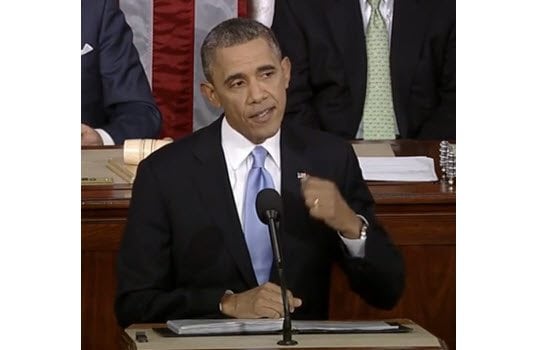FMN Editorial
As his speaking performances go, few were wowed including many of his usual supporters in pundit circles. However, there were a few points that raised an eyebrow.
First, the more mundane areas. Despite climate change not being a hot-button issue among the American public, and by extension voters in the upcoming campaign season, a reasonable slice of the speech used climate change as the wrapper for his energy policy statements. As also is common, some of the statements on energy policy that were presented as fact are far more open to interpretation and further discussion than the president would suggest.
At a time when the science underlying climate change has never been in greater doubt, or at least its link to human activity relative to the sun and water vapor and the most alarmist claims of its activists, the president stated: “The debate is settled. Climate change is a fact.” Countering that statement, among a variety of non-supportive developments in recent years, is the actual fact that there has not been any warming for the past 15 years, which is raising significant questions about the models used to support much of the research that has been conducted.
A June 20, 2013, Spiegel interview with Hans von Storch outlined the impact of this specific development on the current state of climate science. Storch is a professor at the Meteorological Institute of the University of Hamburg, and has been the director of the Institute for Coastal Research at the Helmholtz Research Centre in Geesthacht, Germany. He is a member of the advisory boards of the journals Journal of Climate and Annals of Geophysics. He stated:
“So far, no one has been able to provide a compelling answer to why climate change seems to be taking a break. We’re facing a puzzle. Recent CO2 emissions have actually risen even more steeply than we feared. As a result, according to most climate models, we should have seen temperatures rise by around 0.25 degrees Celsius (0.45 degrees Fahrenheit) over the past 10 years. That hasn’t happened. In fact, the increase over the last 15 years was just 0.06 degrees Celsius (0.11 degrees Fahrenheit) — a value very close to zero. This is a serious scientific problem that the Intergovernmental Panel on Climate Change (IPCC) will have to confront when it presents its next Assessment Report late next year.”
The president also linked recent, extreme weather events, which if looked at historically are not all that extreme or rare, with climate change.
President Obama went on to take a significant amount of credit for the country’s increasing energy independence, despite the fact that the administration has a strong track record of being aggressively opposed to (most) fossil fuels that are leading to this independence. For example, while a significant amount of new gas and oil reserves are being developed on private land, this is not the case on the public lands.
The president strongly touted the nation’s highly subsidized solar efforts, largely as a jobs program for solar panel installers. No mention was made of Solyndra.
There were some interesting points that are instructive from a policy perspective and that may affect the future price of both crude and refined fuels.
First, the president was bullish on natural gas, a position that is unfortunately at odds with his environmental base, pointing out that businesses plan to invest almost $100 billion in new factories that use natural gas. He stated a willingness to reduce the red tape involved with getting factories on board with the fuel and appealed to Congress to provide support “…putting people to work building fueling stations that shift more cars and trucks from foreign oil to American natural gas.”
Second, the president seemed to imply that the transportation industry would see its version of the CAFÉ standards changes he implemented to increase automobile gas mileage. Obama stated: “When we rescued our automakers, for example, we worked with them to set higher fuel efficiency standards for our cars. In the coming months, I’ll build on that success by setting new standards for our trucks, so we can keep driving down oil imports and what we pay at the pump.”
And finally, we get to renewable energy. Or, more accurately — the lack of references from the president regarding renewable energy. Biodiesel and ethanol supporters recently have been both disappointed and perplexed at the president’s lack of notable opposition to weakening the renewable fuels mandates and support in pushing lapsed tax incentives. Natural gas was discussed, vehicle mileage was discussed and even solar. But, there was no discussion about the importance of renewable energy in the president’s energy policy. Perhaps the concerns of renewable energy producers and marketers about the current president’s commitment are warranted.
Other Feedback on Obama’s Energy Remarks:
Forbes: Obama’s ‘All-The-Above’’ Energy Push Becomes A Strategy Of One
Forbes: The Best Energy Policy Is The Least Energy Policy
Christian Science Monitor: State of the Union: Is Obama’s ‘all-of-the-above’ energy working?
SF Chronicle: Obama’s lonely road on energy
Clean Technica: Obama: Jekyll & Hyde On Energy
BayouBuzz: Obama SOTU Speech Clogs Keystone Pipeline; Louisiana Officials Bristle








